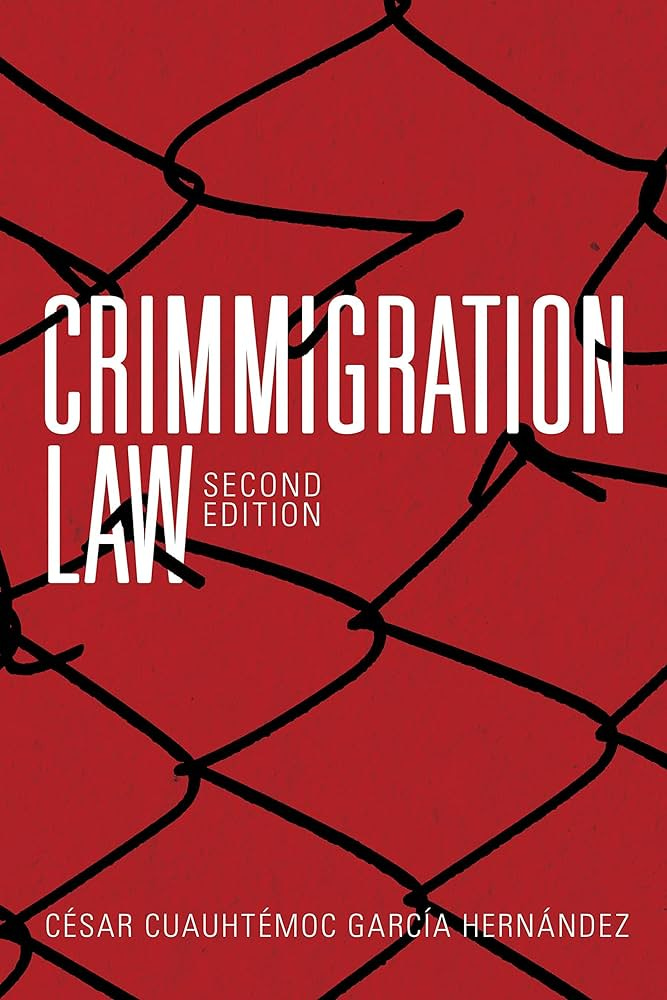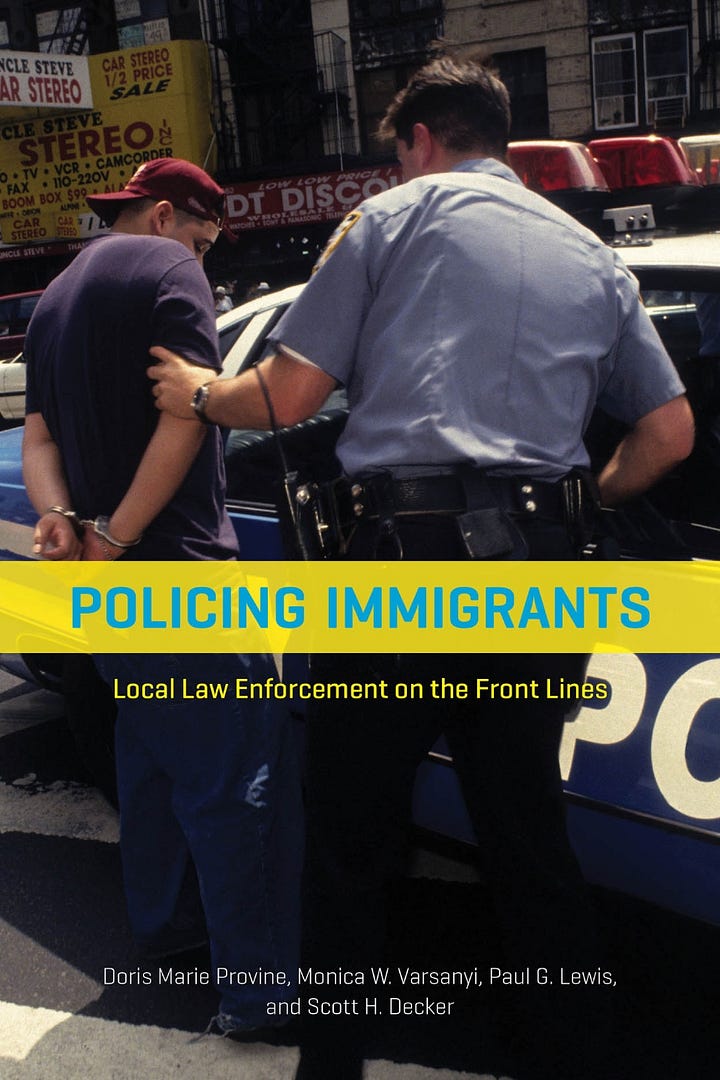Conference Announcement: "Crimmigration through Time, Space, and Culture"
The abstract deadline for the upcoming crimmigration conference at Lewis & Clark University in Portland, Oregon, on March 1-2 has been extended to January 15. Join us!
One of the conferences I’m most excited to attend the new year is the upcoming crimmigration conference. The "Crimmigration through Time, Space, and Culture" conference aims to take the concept of “crimmigration” coined by Juliet Stumpf in her 2006 article “The Crimmigration Crisis: Immigrants, Crime, and Sovereign Power” and expand it theoretically, geographically, and historically beyond its current application to the U.S. context.
Update (02/13/2024): the conference program is now available online here.
“Crimmigration” is a portmanteau of criminal and immigration. In its simplest form, crimmigration is the phenomenon of growing overlap and convergence of the immigration system and the criminal legal system.
Consider the mountain of evidence for this “crimmigration” phenomenon.
Since the 1990s, most of the substantive changes to immigration policy have not come in the area of modernizing our immigration system or updating visa allotments. Instead, most of Congress’s changes to immigration law have come in the form of adding criminal penalties for immigration violators and expanding immigrant detention (which is nominally civil, but very much mirrors criminal prisons).
DHS and the DOJ created programs like Operation Streamline to rapidly prosecute migrants in federal court and the Zero Tolerance Policy that separated migrant families at the border.
Most recently, Texas Governor Greg Abbott signed a bill that makes unlawful entry a crime in the state of Texas (though this law seems unlikely to survive legal challenges).
As these examples show, the convergence of immigration enforcement and the criminal legal system has been taking place at all scales of government for many years now. Researchers have been studying crimmigration for some time now in a relatively small but I would say coherent, interdisciplinary, and critical way that brings together the social sciences and legal studies.
For example, Amada Armenta’s article on race and crimmigration (titled: “Racializing Crimmigration: Structural Racism, Colorblindness, and the Institutional Production of Immigrant Criminality”) is a very good read. Download it here.
There is a significant shortcoming in the existing literature: it focuses overwhelmingly on North America and, to a lesser extent, Europe.
The conference organizers hope to push the theme of crimmigration in new directions by opening up the concept of crimmigration to critique and by taking crimmigration to new geographic and historic contexts.
This is necessary because even if we can say that crimmigration emerged and developed in the United States, it certainly has not stayed put. Rather, crimmigration—something of a migrant itself—has traveled internationally and taken root in places beyond the U.S., either through explicit policy transfer or through what is known in technology studies as “independent invention” (i.e., two people create similar inventions entirely independent of one another).
For all these reasons and more, I’m excited to see how the conference presenters engage with these questions of crimmigration now nearly twenty years since Juliet generously gave us this term.
If you can join us, please do! The abstract deadline is on January 15. There is already a terrific list of speakers locked in, including:
Ahilan Arulanantham, Co-Director, Center for Immigration Law & Policy, UCLA Law
Valsamis Mitsilegas, Dean of the School of Law & Social Justice & Professor of European & Global Law, School of Law and Social Justice, University of Liverpool
Sanja Milivojevic, Co-Director Border Criminologies, University of Bristol
César Cuauhtémoc García Hernández, Gregory H. Williams Chair in Civil Rights and Civil Liberties, Ohio State University
Roberto Dufraix-Tapia, Professor and Director, Universidad de Tarapacá, Chile
Irene Vega, University of California, Irvine
Smadar Ben-Natan, Jackson School of International Studies, University of Washington
Jennifer Chacón, Bruce Tyson Mitchell Professor of Law, Stanford Law School
Rawan Arar, Law, Societies & Justice, University of Washington
For a more detailed legal look at the crimmigration phenomenon, consider picking up Crimmigration Law by my colleague César Cuauhtémoc García Hernández now in its second edition. For a look at immigration policing at the local level, I recommend Policing Immigrants: Local Law Enforcement on the Front Lines by Doris Marie Provine, Monica W. Varsanyi, Paul G. Lewis, and Scott H. Decker. Marie Provine—surprise, surprise—is one of the conference organizers.


Official Conference Summary
The following is the official conference summary from the website. See the links below for the website and the official conference announcement.
Crimmigration has gone global. This conference, a collaboration between the CINETS Crimmigration Control network and Oxford-based Border Criminologies, aims to question and broaden the study of crimmigration to include more attention to migration-control strategies in the Global South, to the impact of colonialism, and to compare across less-studied boundaries, both actual and theoretical. We also invite new ideas about the connections of crimmigration to its past and likely future, innovative methods to study crimmigration, as well as critiques of the crimmigration thesis. We anticipate a lively discussion that includes new geographies, comparative insights, new methodologies, and sensitivity to the evolving efforts of nations to control borders, interior spaces, and populations, along with migrants’ determination to evade those controls.
The conference will encourage cross-global comparisons and invite engagement with new strategies for thinking about the causes and consequences of crimmigration. The goal is to deepen our collective understanding of the colonial links to contemporary migration, the likely futures of immigration, and the criminological responses of states and regions, particularly in the global south, to human movement.
This conference will be in person at Lewis & Clark Law School in Portland, Oregon on March 1–2, 2024. Early career scholars are invited to a get-acquainted event on the evening of February 29th before the conference begins. The conference is generously sponsored by the University of Liverpool and Lewis & Clark Law School.
Please send an abstract and tentative title by January 15, 2024, to Marie Provine (marie.provine@gmail.com). You will be notified on or before January 30 whether your proposal has been accepted.
See the conference page online here or download the full conference announcement below:
Support public scholarship
Thank you for reading. If you would like to support public scholarship and receive this newsletter in your inbox, click below to subscribe for free. And if you find this information useful, consider sharing it online or with friends and colleagues.





Austin I don’t have an abstract but can I just, like, come